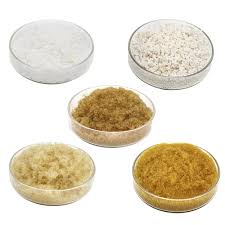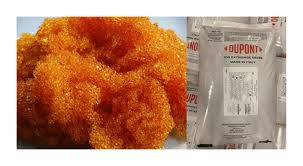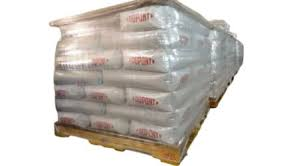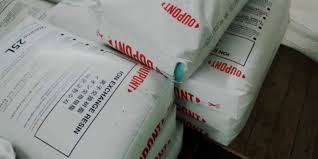DuPont™ AmberLite™ IRA402 Cl Ion Exchange Resin

In the field of industrial water treatment, ion exchange resin is a pivotal material that realizes deep demineralization and high-purity water production. Among the diverse range of ion exchange resins, DuPont™ AmberLite™ IRA402 Cl Ion Exchange Resin stands out as a general-purpose, high-reliability option. With its balanced performance in capacity, mechanical strength, and silica selectivity, it has become a staple in industrial demineralization systems. This article will first elaborate on the fundamental role of ion exchange resins in water treatment, then systematically introduce the product characteristics, technical parameters, application scenarios, and safe operation guidelines of DuPont™ AmberLite™ IRA402 Cl Ion Exchange Resin (based on its official product data sheet: IER-AmberLite-IRA402-Cl-PDS-45-D01251-en.pdf), providing a comprehensive reference for industrial users seeking efficient water treatment solutions.
Ion exchange resins achieve water purification by selectively exchanging ions with impurities in water, and they are mainly classified into three categories according to their functional properties, each undertaking unique purification tasks to meet diverse industrial needs:
Cation Exchange Resins: Equipped with negatively charged active sites, they specialize in adsorbing and exchanging positively charged ions (cations) such as calcium (Ca²⁺), magnesium (Mg²⁺), and sodium (Na⁺) in water. They are widely used in water softening processes to prevent scaling in industrial equipment like boilers and heat exchangers, thus extending equipment service life and ensuring stable production.
Anion Exchange Resins: Featuring positively charged active sites, they target negatively charged ions (anions) including chloride (Cl⁻), sulfate (SO₄²⁻), and silica (SiO₂). As a high-quality strong base anion resin, DuPont™ AmberLite™ IRA402 Cl Ion Exchange Resin excels at removing these anions, especially silica which is difficult to handle, playing a crucial role in deep demineralization.
Mixed Bed Ion Exchange Resins: A physical mixture of cation and anion exchange resins, they can simultaneously remove cations and anions in a single treatment step. This type of resin simplifies the water treatment process, significantly improves water purity, and is suitable for scenarios requiring ultra-pure water, such as electronic manufacturing and pharmaceutical production.
In industrial demineralization systems, the synergistic combination of cation and anion exchange resins (like DuPont™ AmberLite™ IRA402 Cl paired with cation resins) forms an efficient purification system, ensuring that the treated water meets the strict water quality standards of various industries.
DuPont™ AmberLite™ IRA402 Cl Ion Exchange Resin is a gel-type, strong base anion exchange resin (Type I) with a Gaussian particle size distribution. It is a general-purpose demineralization resin with a long-standing reputation for reliable performance in the industry. The resin is designed to balance key properties such as exchange capacity, mechanical strength, silica selectivity, and service life, making it particularly suitable for co-flow regenerated systems in a variety of industrial water treatment applications.
Historically, this resin has been widely used in industrial demineralization scenarios, and its stable performance and cost-effectiveness have made it a trusted choice for many enterprises. Whether in chemical, power, or electronic industries, it can provide consistent and efficient demineralization effects, helping enterprises solve water quality problems in production processes.
The excellent performance of DuPont™ AmberLite™ IRA402 Cl Ion Exchange Resin is supported by its superior technical parameters. The following table sorts out the key indicators from the official product data sheet for users' reference:
| Parameter Category | Specific Indicators |
|---|
| Basic Properties | - Brand: DuPont Resins
- Model: AmberLite™ IRA402 Cl
- Type: Strong base anion exchange resin (Type I)
- Matrix: Gel
- Copolymer: Styrene-divinylbenzene
- Functional Group: Trimethylammonium
- Physical Form: Amber, translucent, spherical beads
- Ionic Form (as Shipped): Cl⁻ |
| Chemical Properties | - Total Exchange Capacity: ≥ 1.20 eq/L (Cl⁻ form)
- Water Retention Capacity: 49.0 – 59.0% (Cl⁻ form)
- Swelling (Cl⁻ → OH⁻): ≤ 20% |
| Particle Size | - Particle Diameter: 600 – 750 μm
- Uniformity Coefficient: ≤ 1.80
- Content of Particles < 300 μm: ≤ 1.0%
- Content of Particles > 1180 μm: ≤ 5.0% |
| Stability & Density | - Whole Uncracked Beads: ≥ 90%
- Particle Density: 1.07 g/mL
- Shipping Weight: 670 g/L |
| Operating Range | - Temperature Range (Cl⁻ form): 5 – 100°C (41 – 212°F); (OH⁻ form): 5 – 60°C (41 – 140°F) [Note: Operating above 60 – 70°C may affect resin life]
- pH Range (Service Cycle): 1 – 14; (Stable): 0 – 14 |
These parameters comprehensively reflect the resin's ion exchange capacity, physical stability, and adaptability to operating environments, providing a solid technical basis for its application in industrial demineralization.
Based on its performance characteristics and official positioning, DuPont™ AmberLite™ IRA402 Cl Ion Exchange Resin is mainly applied in industrial demineralization scenarios, with the following core application focuses:
The resin is particularly suitable for treating water with a high percentage of silica. In industrial production processes such as power generation, chemical engineering, and electronic manufacturing, silica in water is a major threat to equipment safety and product quality. For example, in power plants, silica can form hard scales on boiler heating surfaces, reducing heat transfer efficiency and even causing boiler tube burst accidents; in electronic chip production, trace silica can affect the accuracy of chip circuits. DuPont™ AmberLite™ IRA402 Cl Ion Exchange Resin has excellent silica selectivity, can efficiently adsorb silica in water, and minimize silica leakage, ensuring that the treated water meets the strict requirements of these industries for silica content.
In industrial wastewater or process water, strong acids (such as hydrochloric acid, sulfuric acid) and weak acids (such as carbonic acid, silicic acid) are common impurities. These acidic substances not only corrode industrial equipment but also interfere with chemical reactions and product quality. The resin can effectively remove both strong and weak acids by exchanging anions, neutralizing the acidity of water, and creating a stable water quality environment for industrial production. For example, in the chemical industry, it can treat process water to avoid acid corrosion of reaction vessels and ensure the normal progress of chemical reactions; in the pharmaceutical industry, it can purify intermediate water to prevent acidic impurities from affecting drug purity.
The resin is specially designed for co-flow regenerated systems, which are widely used in industrial water treatment due to their simple structure and easy operation. In co-flow systems, the regenerant and water flow in the same direction, and the resin's Gaussian particle size distribution and balanced mechanical strength ensure uniform regeneration and stable operation of the system. It can maintain high exchange capacity and long service life in co-flow systems, reducing the frequency of resin replacement and lowering the overall operating costs of the water treatment system.
The hydraulic characteristics of the resin directly affect the operation efficiency and stability of the water treatment system. The official product data sheet provides two key hydraulic parameters for DuPont™ AmberLite™ IRA402 Cl Ion Exchange Resin:
Backwash Expansion: The estimated bed expansion of the resin varies with backwash flow rate and temperature (10 – 60°C / 50 – 140°F), as shown in Figure 1 of the data sheet. Backwashing is a critical step in resin regeneration, which can remove impurities trapped in the resin bed and restore the resin's adsorption capacity. Proper backwash expansion (generally 40% – 80%) is conducive to thorough impurity removal without excessive resin loss. Operators can adjust the backwash flow rate according to the actual temperature and impurity content to ensure the backwash effect.
Pressure Drop: The estimated pressure drop of the resin changes with the service flow rate and temperature (10 – 60°C / 50 – 140°F), as shown in Figure 2 of the data sheet. The pressure drop data is valid at the start of the service run with clean water and a well-classified bed. Excessive pressure drop will increase the energy consumption of the system and may damage the resin or equipment; too low pressure drop may indicate insufficient contact between water and resin, affecting the ion exchange effect. Operators need to monitor the system pressure in real time and adjust the flow rate within a reasonable range.
Temperature Control: The resin has different temperature adaptabilities in different ionic forms. In the Cl⁻ form, it can operate within 5 – 100°C (41 – 212°F); in the OH⁻ form, the recommended operating temperature range is 5 – 60°C (41 – 140°F). It should be noted that operating at elevated temperatures (such as above 60 – 70°C / 140 – 158°F) may accelerate resin aging and shorten its service life. Therefore, when operating at high temperatures, it is necessary to consult DuPont's technical representatives in advance to obtain professional guidance and adjust system parameters appropriately.
pH Adaptability: The resin has excellent stability in the pH range of 0 – 14 and can operate normally in the pH range of 1 – 14 during the service cycle. This wide pH adaptability allows it to cope with various acidic and alkaline water sources in industrial production without additional pH adjustment steps, simplifying the operation process and reducing equipment investment.
Additional Guidance: For parameters such as the recommended minimum bed depth of the resin, specific operating conditions, and regeneration conditions in separate beds, please refer to DuPont's technical document Form No. 45-D01131-en. This document provides detailed operational guidelines to help users optimize the water treatment system and achieve the best demineralization effect.
When using DuPont™ AmberLite™ IRA402 Cl Ion Exchange Resin, safety must be the top priority. The official product data sheet emphasizes the following key warnings:
WARNING: Oxidizing agents such as nitric acid may attack organic ion exchange resins under certain conditions. This can lead to slight resin degradation (such as reduced exchange capacity) or even violent exothermic reactions (including explosions) in severe cases. Before using strong oxidizing agents in the water treatment system (such as disinfection with high-concentration oxidants), it is necessary to consult professionals familiar with the handling of such materials, formulate scientific operating procedures, and conduct pre-tests to ensure that the resin and oxidizing agents are compatible under the current conditions.
In addition, when replacing or regenerating the resin, operators should wear appropriate protective equipment (such as chemical-resistant gloves, goggles, and overalls) to avoid direct contact with the resin or regeneration chemicals. At the same time, ensure good ventilation in the operation area to prevent the accumulation of harmful gases and avoid potential safety hazards. Before using the resin, it is also necessary to carefully read the Safety Data Sheet (SDS) provided by DuPont to fully understand the safety risks and handling precautions of the product.
If you are interested in DuPont™ AmberLite™ IRA402 Cl Ion Exchange Resin or need customized industrial water treatment solutions (including matching cation resins, system design, and technical support), you can purchase and consult through FG Water Technologies. As a high-tech enterprise integrating water treatment equipment design, manufacturing, trade, and shipment, FG Water Technologies provides one-stop services from product supply to technical guidance, ensuring that your water treatment needs are fully met.
Official Website: Visit https://www.fgwater.com/ to browse detailed product information, technical documents, and successful case studies of water treatment systems.
Telephone Contact:
Mobile: +86-13646187144 (available 24/7 for urgent consultations and technical inquiries)
Office: +86-510-85163211 (weekday business hours for project quotes, order placement, and in-depth technical communication)
Email Consultation: Send your specific needs (such as application scenario, water volume, water quality indicators, and expected treatment effect) to [email protected]. The professional technical team of FG Water Technologies will reply to you within 24 hours, provide tailored solutions and accurate quotations, and assist you in solving water treatment problems.
FG Water Technologies not only provides genuine DuPont ion exchange resins but also offers a full range of water treatment equipment and services, including containerized water purification systems, reverse osmosis systems, and ultrafiltration membrane modules. It can customize the most suitable water treatment solutions according to the actual needs of enterprises, helping enterprises achieve efficient, economical, and stable water treatment operations.


